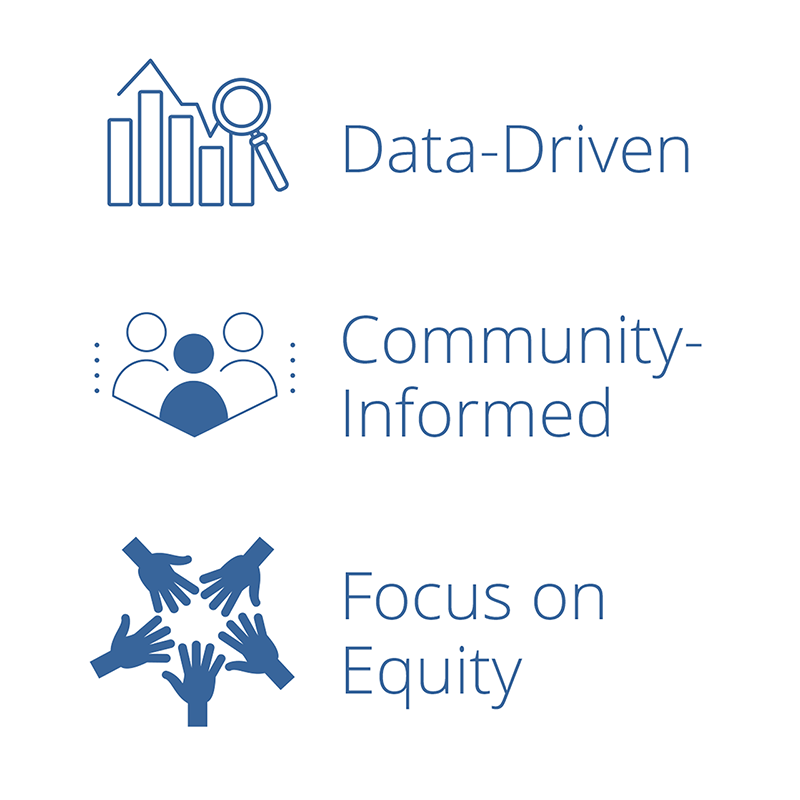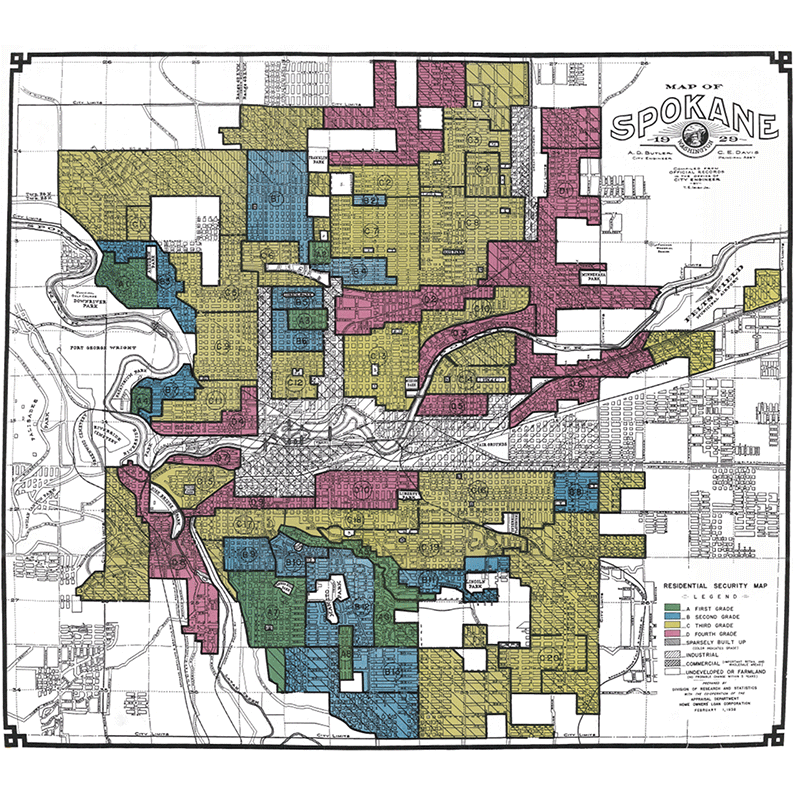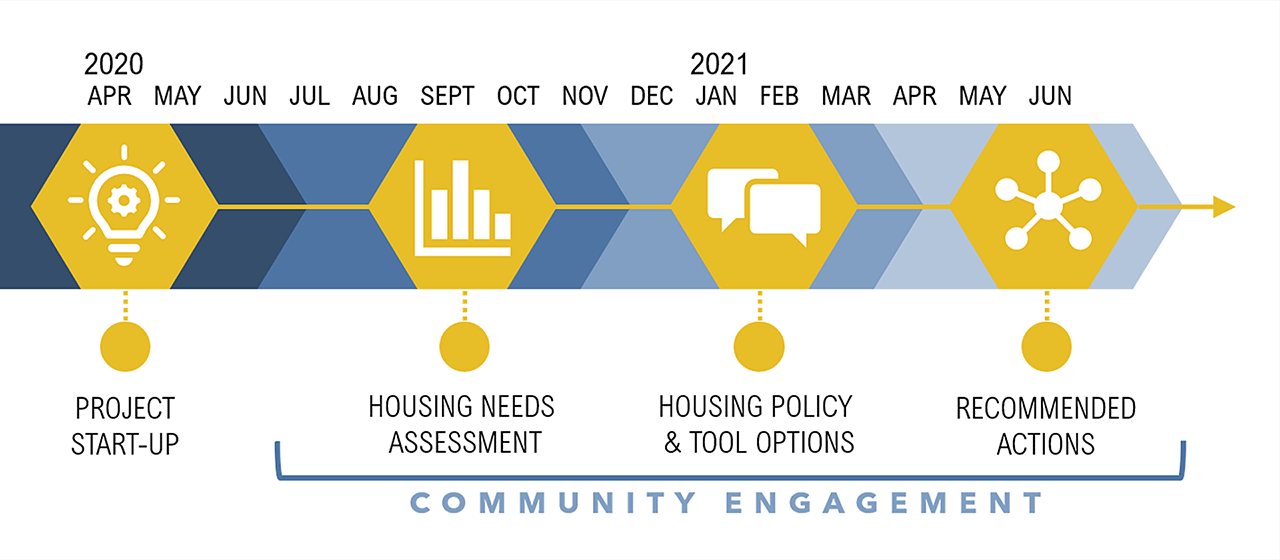Spokane Housing Action Plan
Announcements
The City Council adopted the Final Housing Action Plan by resolution on July 26, 2021. The City of Spokane created the Housing Action Plan to develop policy to help increase housing options that are affordable and accessible for people and families of all incomes. The HAP provides guidance for City staff, elected officials, and decision-makers to encourage the construction of additional affordable and market-rate housing that meets Spokane's current and future housing needs.
Final Housing Action Plan
- Final Housing Action Plan with appendices – July 26, 2021 (PDF 19.4 MB)
- Resolution 2021-0062 (PDF 19 MB)
City Council Public Hearing
City Council Public Hearing and Adoption by Resolution: Monday, July 26, 2021 at 6:00 pm
City Council Study Sessions
The Draft Housing Action Plan has was discussed at the following City Council study sessions:
- City Council Study Session: June 10, 2021 at 11:00 am
- City Council Study Session: July 1, 2021 at 11:00 am
Plan Commission Workshops and Public Hearing
The Spokane City Plan Commission held a public hearing on Wednesday, May 26, 2021, at 4:00 PM, online via the WebEx Meetings software and over the phone. Following public testimony, the Plan Commission closed the public hearing and completed deliberations on Wednesday, June 9, 2021. The Plan Commission voted to recommend the Draft Housing Action Plan to the City Council for adoption by resolution.
- Plan Commission Public Hearing: May 26, 2021
- Presentation (PDF 1.1 MB)
- Video
- Plan Commission Deliberations: June 9, 2021
- Online Open House: In addition, City staff hosted an online open house for the public to tune in, learn about the Draft Housing Action Plan, and ask questions.
- Open House #1: Tuesday, May 18, 2021 at 12:00 pm (Zoom)
- Presentation (PDF 2.2 MB)
- Video
- Open House #2: Tuesday, May 18, 2021 at 6:00 pm (Zoom)
- Open House #1: Tuesday, May 18, 2021 at 12:00 pm (Zoom)
- Plan Commission Workshops: Staff presented and discussed the Draft HAP with the Plan Commission at the following online workshops:
- Wednesday, May 12, 2021 at 2:00 pm – Plan Commission Workshop (Webex)
- Wednesday, May 19, 2021 at 2:00 pm – Plan Commission Workshop (Webex)
Get Involved
We want to hear from the community throughout the process so that the housing strategies will reflect all residents and be grounded in community members' knowledge of Spokane's strengths and challenges. We are continually monitoring the public health considerations for COVID-19. We will follow current guidance from the City on engagement, and create opportunities for the community to share experiences and provide input in a safe and accessible manner.
- Sign up to receive email announcements about this project.
- Connect with the project by emailing us at spokanehousingplan@spokanecity.org
- Stay tuned! Check this page for more opportunities to share your ideas as this project continues.
Materials and Presentations
Spokane Housing Experiences and Issues Community Surveys
The City completed two community surveys on housing experiences and issues as part of the Housing Action Plan: one focusing on residents of the City of Spokane and one focusing on people who work in Spokane and live outside the City. The survey was available in 6 languages: English, Spanish, Russian, Arabic, Marshallese, and Vietnamese. The survey was open in November and December, and we received over 1,200 responses. We also completed a survey of housing industry professionals. The following summaries provide an overview of responses.
- Live in Spokane Housing Survey – Response Summary – Feb 19, 2021 (PDF 381 KB)
- Work in Spokane Only Housing Survey – Response Summary – Jan 29, 2021 (PDF 198 KB)
- Housing Industry Professional Survey Summary – February 11, 2021 (PDF 119 KB)
Draft Displacement Risk Analysis
Displacement can have a life-changing negative effect on households that are directly impacted. It can also disrupt the social fabric and networks of trust and support that existing within a community. For these reasons, understanding potential displacement risks in a community is an important step in assessing housing needs. Displacement refers to instances where a household is forced or pressured to move from their home against their wishes. The Draft Displacement Risk Analysis provides an introduction into looking at what areas and who is at risk for displacement in the City.
Draft Housing Needs Assessment
The Draft Housing Needs Assessment, prepared by ECONorthwest, is part of the deliverables provided for the Housing Action Plan. It helps define the range of housing needs by analyzing data that describes the city of Spokane's housing and associated demographic, workforce, and market trends over the past few decades. The draft assessment also provides a comparison to Spokane County.
- City of Spokane – Draft Housing Needs Fact Packet – December 7, 2020 (PDF 8.1 MB)
- City of Spokane – Housing Needs Assessment Methods Memo – October 4, 2020 (PDF 305 KB)
Additional Data Analysis
This document provides additional data analysis on community and regional housing needs, trends, and gaps for the Spokane Housing Action Plan. This will be updated as needed throughout the process.
Housing Action Plan Working Group
The Housing Action Plan Working Group will provide guidance on the project process and analysis, as well as the contents of the final Housing Action Plan. The working group is comprised of housing stakeholders, community groups, and community members who will support and represent a variety of perspectives and experiences in the community.
- Housing Action Plan Working Group Meeting #1 – July 29, 2020
- Agenda Materials (PDF 192 KB)
- Presentation (PDF 2.2 MB)
- Meeting #1 Summary (PDF 211 KB)
- Housing Action Plan Working Group Meeting #2 – October 21, 2020
- Agenda Materials (PDF 134 KB)
- Presentation (PDF 1.9 MB)
- Meeting #2 Summary (PDF 120 KB)
- Housing Action Plan Working Group Meeting #3 – December 15/16, 2020
- Agenda Materials (PDF 164 KB)
- Presentation (PDF 4.5 MB)
- Meeting #3 Summary (PDF 183 KB)
Stakeholder Roundtables
The City hosted a series of virtual roundtables in September 2020 as an opportunity to dive deeper into key topics and discuss potential strategies with stakeholders, partners, and community groups and members.
Development Regulations – September 10, 2020
- Agenda (PDF 95 KB)
- Presentation Overview (PDF 1.3 MB)
- Discussion Notes (PDF 162 KB)
Land Use and Housing Policy – September 15, 2020
- Agenda (PDF 118 KB)
- Presentation Overview (PDF 1.8 MB)
- Discussion Notes (PDF 147 KB)
Equity in Housing – September 17, 2020
- Agenda (PDF 206 KB)
- Presentation Overview (PDF 1.5 MB)
- Discussion Notes (PDF 170 KB)
Affordable Housing and Rental Housing – September 23, 2020
- Agenda (PDF 323 KB)
- Presentation Overview (PDF 1.0 MB)
- Discussion Notes (PDF 230 KB)
Updates
City Council Updates
- Urban Experience – June 8, 2020 (PDF 324 KB)
- City Council Study Session 1 – October 15, 2020
- Project Update and Draft Housing Needs Assessment Presentation – October 15, 2020 (PDF 1.8 MB)
- View meeting video – October 15, 2020.
- City Council Study Session 2 – January 7, 2021
- Project Update and Draft Housing Needs Assessment Presentation – January 7, 2021 (PDF 2.1 MB)
- View meeting video – January 7, 2021.
- City Council Study Session 3 – February 11, 2021
- View meeting video – February 11, 2021.
- City Council Study Session 4 – February 18, 2021
- View meeting video – February 18, 2021.
- City Council Study Session 5 – February 25, 2021
- View meeting video – February 25, 2021.
Plan Commission Updates
- Update 1 Presentation – July 22, 2020 (PDF 2.0 MB)
- Update 2 Presentation – September 9, 2020 (PDF 1.4 MB)
- Update 3 Presentation – September 23, 2020 (PDF 1.5 MB)
- Update 4 Presentation – November 11, 2020 (PDF 992 KB)
- Update 5 Presentation – February 10, 2021
- Update 6 Presentation – February 24, 2021
Board and Commissions Updates
- CHHS Board – August 5, 2020 (PDF 1.0 MB)
- Human Rights Commission – August 5, 2020 (PDF 1.0 MB)
- Community Assembly – September 3, 2020 (PDF 752 KB)
Project Approach

The Housing Action Plan will follow a data-driven, community-informed approach with a focus on equity built on inclusive outreach and engagement with residents, partners, and City leaders. The plan will be developed in collaboration with a stakeholder working group and public input throughout the process, and data and evidence will build a common and accurate understanding of current and future housing needs. The core part of this will be to conduct a housing needs assessment to help us answer questions about our community#&39;s housing needs.
The Housing Action Plan will work to answer these important questions and more:
- How much housing, and what types of housing, are needed to meet current and future housing needs?
- How effective are our current policies at increasing options and supply?
- How do we encourage the development of housing for all income levels, including low-income, moderate, and market rate housing?
- What strategies can the City consider to minimize and prevent displacement of low-income residents to support equitable growth for all?
- How can the City, residents, property owners, service providers, businesses, and non-profits work together to improve Spokane's housing options?
Equity in Housing
As the City addresses housing needs and affordability challenges, it is important to understand and consider the historic context that has contributed to the patterns of inequity present today. Housing options, and especially homeownership, are not equally accessible to everyone in the community. Practices such as 'red lining,' restrictive covenants on property, and exclusionary zoning have had long-lasting impacts on neighborhoods, like wealth inequality, less access to opportunity, and lower health outcomes. These inequalities are reproduced across generations, leading to continued patterns of inequality today.

As part of the focus on equity in the Housing Action Plan, we will work to understand and address the history of racial and income inequality. This includes:
- Reviewing local zoning practices
- Understanding barriers to accessing housing and homeownership
- Working with impacted voices to understand experiences
- Identify communities at risk of displacement
- Consider strategies to address equitable outcomes
Learn more about housing discrimination in Spokane:
In 2019, the Northwest Fair Housing Alliance created a video outlining the history of housing discrimination in Spokane, funded under a grant from the U.S. Department of Housing and Urban Development. View the video and learn more: Systemic Residential Race Discrimination in Spokane - A 6 Minute History.
The federal-sponsored Homeowners' Loan Corporation (HOLC) created maps in cities across the country in the 1930s to evaluate lending risk. Neighborhoods considered high risk were “hazardous” or "redlined," meaning they were denied loans and capital investment. This often corresponded to the presence of low-income households, African Americans and immigrants. Learn more at the University of Richmond's Mapping Inequality project.
Previous and Ongoing Housing Initiatives
The City of Spokane and community have participated in a number of housing initiatives over the past five years to address infill housing, housing quality and affordability, code changes, and other important housing topics. The Housing Action Plan seeks to build upon these discussions and push forward recommendations into action.

Below are links to related housing initiatives and recommendations:
Background
In 2019, the Washington Legislature passed E2SHB 1923 to increase residential capacity in cities across Washington. The bill emphasizes the need to increase housing supply for all income levels, and encourages cities to prioritize the creation of affordable, inclusive neighborhoods. The City of Spokane received a grant from Commerce to develop our local housing action plan. This planning process builds on previous City initiatives around infill housing and housing choice, safe and quality housing, affordable housing construction, and re-housing for those experiencing homelessness.
The City of Spokane is creating the Housing Action Plan to help increase housing options that are affordable and accessible for people and families of all incomes. As Spokane grows, we are facing a gap in housing supply. The plan will provide a strategic approach to address current and future housing needs of the Spokane community. When completed, it will provide a coordinated vision that supports more people being able to find a home that meets their needs with access to opportunities, services and amenities. This process builds upon previous community discussions and initiatives around infill development, housing quality, and affordable housing funding.
Spokane's Housing Action Plan will:
- Encourage construction of additional affordable and market rate housing that are accessible to a variety of income levels. This includes options accessible to people and families with low and moderate incomes and cost-burdened households.
- Examine population, workforce and housing trends.
- Assess housing policies, development regulations, and other city programs that influence the development of housing.
- Consider strategies to minimize displacement, particularly in neighborhoods with communities at high risk of displacement.
The City received a grant from the Washington Department of Commerce to complete the plan, which is expected to adopted by City Council in June 2021.
View the overview video of the Housing Action Plan process.

Resources
Contact Information
Maren Murphy, AICP
Principal Planner
509.625.6500
mmurphy@spokanecity.org
Related Links
- Shaping Spokane Housing
- Shaping Spokane Comprehensive Plan
- Investment Incentives
- Affordable Housing
- Community, Housing, & Human Services
- Residential Building Review
- What is the "missing middle" in housing options? (Blog)
- Understanding Housing Displacement Risk in Spokane (Blog)
- Housing Action Plan Finalized (Blog)
- The Future of Housing for All (Blog)

